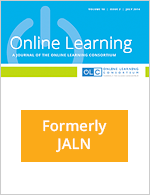Graduate Students Rate Institutional Websites: The Must Have, Nice to Have, and Delighted to Have Services
The graduate students admitted to the online and blended programs in higher education at Texas Tech University and the University of Memphis were surveyed about their respective university websites, or the institution’s “virtual face.” A total of 42 students rated 30 web-based services as “must have,” “nice to have,” “delighted to have (but not necessary),” or “I’m indifferent to this service” based on the Kano model of marketing research into customer satisfaction. The majority (11 of 17) of services in the “must have” category are essential for functioning as a student (e.g., course registration, program costs, helpdesk) while the social media services (podcasts and i-Phone applications) were in the “nice to have” category. Items of importance to the institution (history of the university, strategic plan, contributions to community) were in the “nice to have” or “delighted to have” categories. The continuing interest in viewing photos (of the campus, students, athletics) as a “nice to have” is intriguing for students in online and blended programs. Based on this research, several recommendations are offered to institutions.

